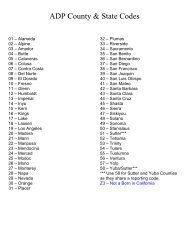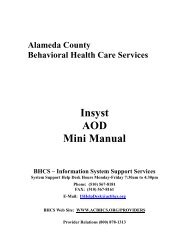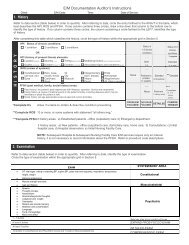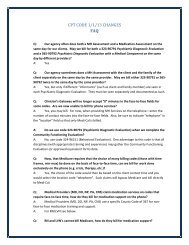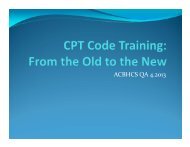Juvenile Competency Protocol - Alameda County Behavioral Health
Juvenile Competency Protocol - Alameda County Behavioral Health
Juvenile Competency Protocol - Alameda County Behavioral Health
Create successful ePaper yourself
Turn your PDF publications into a flip-book with our unique Google optimized e-Paper software.
SECTION FOUR<br />
RETURN OF PRE-TRIAL COMPETENCY EVALUATOR REPORT<br />
Two days before the date scheduled for Receipt of the <strong>Competency</strong> report, the<br />
competency evaluation will be delivered to the Court Clerk’s Office for distribution to<br />
the appropriate trial court. The court clerk in the trial department will distribute copies of<br />
the confidential report to: the judge, probation court officer, defense counsel and the<br />
deputy district attorney. Cal Rules of Ct, Rule 4.130(d)(2).<br />
The report is circulated to the parties at the hearing for Receipt of the <strong>Competency</strong><br />
evaluation. At this hearing, three things can happen: the parties can stipulate to the<br />
opinion of the Pre-Trial <strong>Competency</strong> Evaluator, the parties can submit on the opinion, or<br />
the parties can contest the opinion, and set the matter for a contested competency hearing.<br />
1. The parties can stipulate to the findings of the Pre-Trial <strong>Competency</strong><br />
Evaluator. The court need not accept the stipulation. Absent a stipulation,<br />
canceling the competency trial, based upon the minor being competent<br />
should be done with caution. There must be a solid foundation to support<br />
that the “substantial evidence” that warranted the need for a competency<br />
hearing no longer exist. An erroneous denial of competency compels<br />
reversal of the judgment, because the trial court has no power to proceed<br />
with an underlying trial once a doubt arises about a person’s competence.<br />
People v Pennington (1967) 66 C2d 508, 521. The error is per se<br />
prejudicial and may not be cured by a retrospective determination of the<br />
person’s mental competence during the regular trial. People v Stankewitz<br />
(1982) 32 Cal.3d 80. [Adult cases.]<br />
If the court does not accept the stipulation of the parties, the court should<br />
set a <strong>Competency</strong> Trial. At the trial, the parties could still stipulate to the<br />
Pre-Trial <strong>Competency</strong> Evaluator’s report, and the court would make<br />
whatever findings the court deems appropriate at the hearing. The<br />
<strong>Competency</strong> Trial could be set in a relatively brief time because there<br />
would be no evidence or argument for the attorneys to prepare. The court<br />
presumably could hear the <strong>Competency</strong> Trial that day.<br />
2. The parties can submit the matter to the court for a court determination<br />
based on the Pre-Trial <strong>Competency</strong> Evaluator’s report(s). Basically, the<br />
parties would not be taking position and leaving it up to the court to<br />
decide. The court would need to set a formal <strong>Competency</strong> Trial, or obtain<br />
a stipulation from the parties that the court can issue written findings and<br />
orders without the need for a formal <strong>Competency</strong> Trial. In this case, the<br />
judge would take matter under submission. The judge can issue an oral<br />
decision on the record that day, or submit a written decision shortly<br />
thereafter.<br />
13 Superior Court, <strong>Alameda</strong> <strong>County</strong>, California<br />
<strong>Juvenile</strong> Court, <strong>Juvenile</strong> <strong>Competency</strong> <strong>Protocol</strong><br />
March 1, 2013



